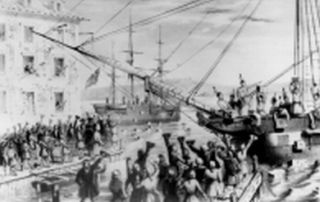Date: December 21, 1773
“Joseph Warren to Arthur Lee.
Boston, Dec. 21st, 1773.
Sir, – My respected friend, Mr. [Samuel] Adams, informs me of the honor he has done me by mentioning my name to you in his letters. I can by no means lose so fair an opportunity of opening a correspondence with one to whom America is under such great obligations. Be assured, sir, we are not insensible to your merits. The clear manner in which you have treated the dispute between Great Britain and this country has, we doubt not, enlightened many in the parent State as well as in this country. But nothing seems able to penetrate the Egyptian darkness which is so palpable in the court atmosphere. We have long waited for something wise and good in the public counsels of the nation; at least we hoped that chance would lead to some measures, which, if not so designed, might eventually have produced some agreeable effects. But hitherto the unpropitious star which rules unhappy Britain has disappointed our wishes; every step taken by the Administration has increased the distance between her and the colonies; and I fear, that, unless a speedy alteration is made in the system of American policy, a few years will render us as indifferent to the interests of the mother-country as to that of any other State in Europe. However, as it is my firm opinion that a connection upon constitutional principles may be kept up between the two countries, at least for centuries to come, advantageous and honorable to both, I always respect the man who endeavors to heal the wound, by pointing out proper remedies, and to prevent the repetition of the stroke, by fixing a stigma on the instrument by which it was inflicted. This country is inhabited by a people loyal to their king, and faithful to themselves; none will more cheerfully venture their lives and fortunes for the honor and defence of the prince who reigns in their hearts, and none will with more resolution oppose the tyrant who dares to invade their rights. From this short but true character of this people, it is easy to see in what manner a wise king or a sagacious minister would treat them. But – !
Mr. Adams will give you a full account of the tea shipped by the East-India Company for this place. It now is in the power of that company to make use of Dutch tea as unpopular in this country as they can desire. They may easily, by a proper application to an all-powerful ministry, lay the colonies under such obligations as would be greatly to the company’s advantage. But it is certain the whole navy of Britain will not prevent the introduction of Dutch [i.e. smuggled tea avoiding the tax] tea; nor will her armies prevail with us to use the English tea, while the act of imposing a duty on that article remains unrepealed. I congratulate you on the honor conferred on your brother by the city of London: in distinguishing merit, they honor themselves.
This will be presented to you by Dr. Williamson, who has labored abundantly in the glorious cause in which we are engaged. I hope soon to be convinced, that the freedom I have taken in writing to you is not disagreeable.
I am, sir, with great esteem, your most obedient humble servant,
Joseph Warren.”
Source: Transcription in Lee, Richard Henry Life of Arthur Lee, 2 vols. Boston: Wells and Lilly, 1829, ii, p. 262. Richard Frothingham Life and Times of Joseph Warren, Boston: Little, Brown, & Co, 1865, pp. 288-289. I am unaware of the present location of the original manuscript.
Commentary: The hated East India Tea was freshly a-brewing in Boston Harbor when Joseph Warren wrote this letter to colonial agent Arthur Lee, then in London. Joseph Warren’s de facto political apprenticeship with Samuel Adams was coming to a new level by Warren’s writing independently and privately to a key correspondent overseas. Formerly Joseph Warren had worked outside of the spotlight, writing op-ed pieces under pseudonyms and composing important sections of Patriotic documents in committee. From the 1772 March Boston Massacre Oration onwards, he was increasingly acting as a public face of the Patriot cause.
Warren’s precise role in the Destruction of the Tea, or the Boston Tea Party as it has become known to history, is unknown. I provide circumstantial evidence that there was a literal ‘stage manager’ for this classic piece of revolutionary theater, and that Warren played such a role.

 Follow
Follow